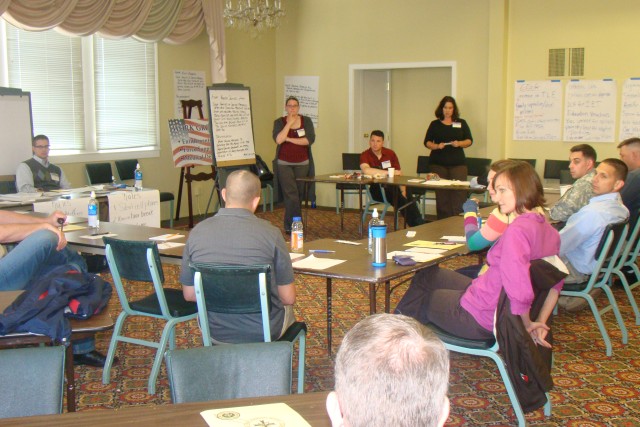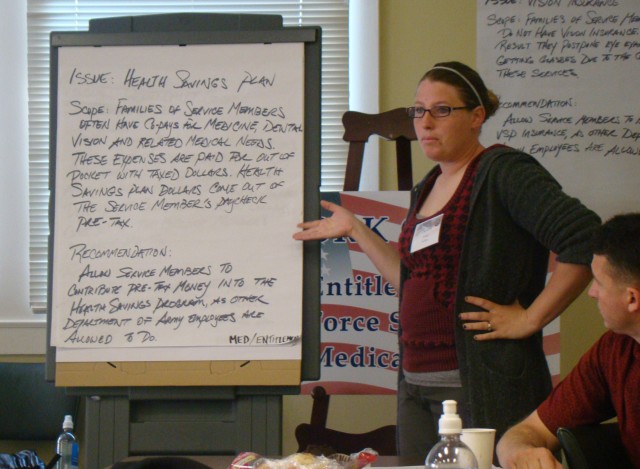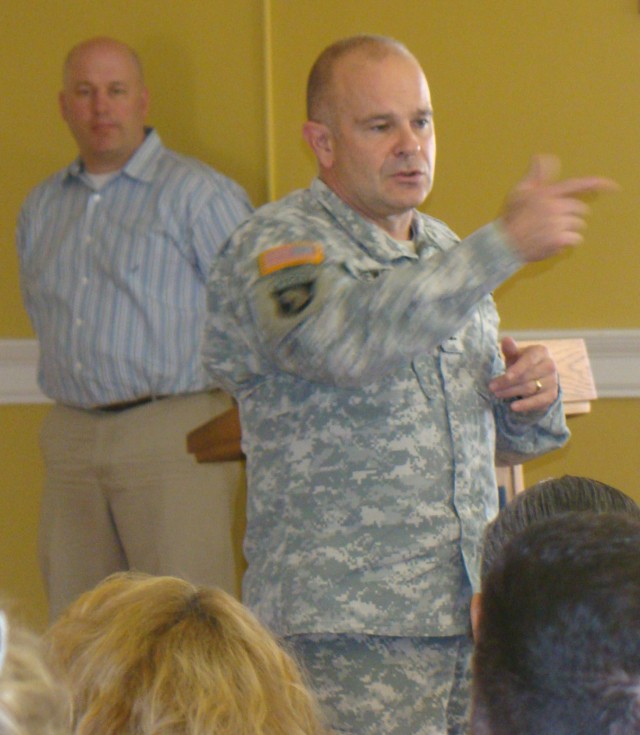PRESIDIO OF MONTEREY, Calif. - Are we doing the right things' Are we doing things right' What are we missing'
Raising those questions describes the aim of the Presidio's 2010 Armed Forces Family Action Plan Conference, an annual event held this year at Weckerling Center Oct. 27 and 28. The approximately 70 volunteer delegates who participated included service members, service family members and civilian employees. Their purpose was to articulate the quality of life issues that are of greatest concern to them.
AFAP Program Manager Tim Clouse got things started on opening day by explaining the conference's method: participants would join one of four work groups, and, through discussion, each group would devise a list of their top issues expressed in carefully chosen words.
The process was painstaking, with participants of each group reporting to their respective conference room for "issue development." There they brainstormed while a designee with a felt-tipped marker jotted their ideas on a poster-size notepad placed in front of them.
The closing activity on the two-day agenda was a face-to-face briefing by representatives of the working groups for Presidio Garrison Commander Col. Darcy A. Brewer and the command staff. Representatives of the garrison's directorates were in the room to answer questions and participate when called upon as the top issues were discussed, group by group, one issue at a time.
"Great stuff," was Brewer's compliment at the close of the briefing. "I appreciate the time that you've taken. I know it's a significant investment and we really appreciate it."
Brewer said some issues called for solutions outside the garrison and that those issues may make their way to higher-level AFAP conferences at major command and Army level. He promised to look into those that can be solved at garrison level.
"We'll get after them, and we'll let you what comes out of this," he said.
The listing that follows summarizes the issues reported by AFAP participants to Brewer and the garrison command.
"Entitlements, Force Support, Medical/Dental" work group
Issue 1: Enhanced medical and dental benefits for dependants.
Scope: Service members' dependants are required to pay out of pocket for medical and dental services that are provided to the service member as a standard benefit. These expenses can become costly, causing emotional, financial and overall wellness burdens for the service member and his or her family.
Recommendation: Create a medical and dental plan that offers dependant medical and dental care equivalent to current active-duty service member treatment benefits to be reviewed annually. This plan would be an additional election that a service member could purchase for his or her family.
Issue 2: Health savings plan.
Scope: Excluded benefits from medical and dental coverage must be paid for out of pocket. Under current entitlements, service members lack the option to contribute pre-tax dollars into the government Health Savings Account. These expenses can become costly causing emotional, financial and overall wellness burdens for the service member and his or her family.
Recommendation: Allow service members to contribute to the government Health Savings Account program allowing them to benefit from the pre-tax cost benefits.
Issue 3: Temporary lodging expenses extension.
Scope: A service member's' entitlement to temporary lodging expenses during a permanent change of station move is limited to a total of 10 days. Finding adequate housing often exceeds this time period. This forces the service member to pay for additional expenses out of pocket and possibly make a bad decision regarding permanent housing.
Recommendation: Increase the t emporary lodging expenses time frame to match regulatory time frame for temporary lodging allowance.
"Education, Employment, Force Support and Medical/Dental" work group
Issue 1: Absence of comprehensive appropriated funds for Army Lodging.
Scope: Lack of appropriated funds to Army Lodging creates a disparity in lodging price and quality among the armed services. Currently the Army is charging more than the other services for comparable lodging supported by appropriated funds. Higher costs force service members to take business elsewhere, which creates hardship and undue stress on service members and their families.
Recommendation: Appropriate funds to standardize quality and pricing in line with the Navy and the Air Force, which receive appropriated funding.
Issue 2: Military Spouse Career Advancement Account (MyCAA) expansion.
Scope: MyCAA limits the funds available to a spouse who already has an associate degree or professional license. Currently the program provides only assistance to begin a portable career. It provides no assistance to a spouses who already has an associate degree or license to transfer or continue education or licensing. This can stagnate a spouse's career and hinders academic advancement.
Recommendation: Provide financial assistance in the transfer of current licenses, professional accreditations and continuing education beyond an associate degree.
"Public Works, Relocation, Transition and Housing" work group
Issue 1: Parking spaces for Defense Language Institute Foreign Language Center faculty and student commuters.
Scope: By 7:30 a.m. parking spaces at the Presidio are limited. Designated DLIFLC parking spaces are not regularly occupied. This is detrimental to DLIFLC's mission because students and faculty are delayed from getting to their place of duty as a result of the lack of parking. Also, during peak hours post shuttles are operating at capacity or near capacity.
Recommendations: (1) Create a park-and-ride system using lots at former Fort Ord and the lower Presidio with stops at lots and the Tyler Street parking garage in Monterey. (2) Create carpool priority spaces and lots similar to those at the Naval Postgraduate School. (3) Work with the city of Monterey to create parking passes for DLIFLC for the Tyler Street Garage.
Issue 2: Designation and prioritization of military housing assignments.
Scope: Staff regulations prohibit fraternization between permanent DLIFLC staff (instructors and cadre) and students. Currently students and instructors are mixed in all communities. This impedes the overall sense of community for long-term military staff. Service members are excluded from unofficial social events. Changing this policy would help remove the transient nature of the current situation for long-term military staff members, eliminate the difficulty in implementing neighborhood watch programs and improve the quality of life.
Recommendations: (1.) Group military staff housing together and separate from student housing. (2) Prioritize and reorganize the housing intake process for military staff with permanent orders.
Issue 3: Accountability of Pinnacle customer service.
Scope: There is a lack of communication between Pinnacle and residents regarding issues such as work orders, pest control, transfers, rent, etc. There is a lack of personal accountability and follow up on outstanding issues. This leads to stress and distraction for service members. It also results in missed classes and loss of productivity.
Recommendations: (1) Expand and improve the method of "door note" communication from Pinnacle and contractors to include mail, e-mail and phone calls until personal contact is made. (2) Use an interactive customer evaluation (ICE) or a similar system to lodge complaints regarding housing that includes local command oversight. (3) Quality control a sample percentage of work orders being completed.
"Single Service Members" work group
Issue 1: Barracks Internet service.
Scope: Currently the only Internet service provided in barracks is underperforming in correlation to the cost. Internet service available in the barracks is significantly slower and more expensive than outside service providers. Lack of sufficient Internet service lowers morale.
Recommendations: (1.) Allow other providers. (2.) Renegotiate a new contract to provide services and prices for service members.
Issue 2: Presidio dining facilities operating hours.
Scope: Recognize the need for all service members to have an appropriate time to eat. Operation hours in the dining facilities do not allow time for unit operations and religious services. This affects unit nutrition, morale and mission-readiness.
Recommendations: Extend dining facility hours on weekdays and weekends. Schedule an additional meal on Sundays. Proposed dining facility hours for Monday through Friday: breakfast from 5 to 7:55 a.m., lunch from 10:45 a.m. to 1 p.m., dinner from 5 to 7 p.m. Proposed kiosk hours for Monday through Friday: breakfast from 6 to 7:55 a.m., lunch from 10:45 a.m. to 1 p.m., dinner from 7 to 9 p.m. Proposed dining facility hours for weekends: breakfast from 7:30 to 9 a.m., lunch from noon to 1 p.m., dinner from 4:30 to 6 p.m.






Social Sharing